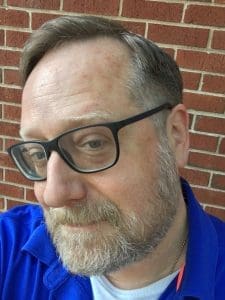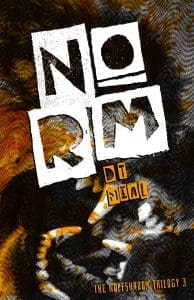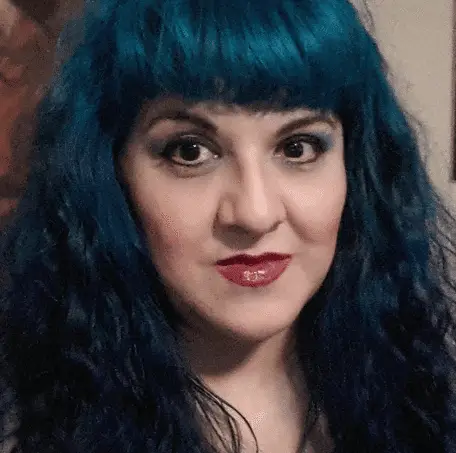The Horror Tree Presents…An Interview with D.T. Neal

 The Horror Tree Presents…An Interview with D.T. Neal
The Horror Tree Presents…An Interview with D.T. Neal
By Ruschelle Dillon
Ruschelle: Today in the darkest part of the Horror Tree Forest we welcome author D.T. Neal who released the third book in the Wolfshadow trilogy, Norm, this past October 31 from Nosetouch Press. A Halloween baby! But a scant month before Neal rolled out the blood red carpet his re-vamped edition of Suckage. Great works from an author to be plucked from Amazon and Barnes and Noble! Before we wrestle with the werewolf let’s discuss your fresh bloodletting of Suckage. What made you decide to re-release it on the unsuspecting public?
D.T.: I love vampires! When I first wrote SUCKAGE, people were still suffering from a very TWILIGHT-infused cultural hangover. I wrote that book as a reaction to the trend of sparkly vampires at the time. Now that what I would consider toothless vampires have come and gone, the time seemed right to exhume SUCKAGE and let it afflict a new bunch of readers. For me, it’s a very Gen X kind of vampire novel, mixing dark humor with horror.
Ruschelle: Where did the concept of telling the tale of Suckage from the minion’s perspective? It’s Guillermo from the television show What We Do in the Shadows, isn’t it? And if you haven’t watched it – don’t tell me! LOL
D.T.: I love WHAT WE DO IN THE SHADOWS! So much fun! When I saw how much attention they paid to the woes of the minion, I think Nate would relate. SUCKAGE originally came out in 2013, ahead of the movie and the television series, but at the time I wrote it, I felt like everyone focused on vampires, and the troublemaker in me was like “Well, what about the minions?” And Nate Sharp was born. I very much thought of it as a metaphor for anyone having to deal with an emotionally draining relationship (pun fully intended). I was in a dark place when I wrote that book, and the book was a reflection of it.
Ruschelle: The werewolf trilogy is now complete…or is it? When you began your first Wolfshadow book did you have plans for three books or was it something that transformed as you were penning that first novel?
 D.T.: When I originally wrote SAAMAANTHAA, I only saw it as a one-off horror novel—trying to do right by werewolves. And I think it works on that level, following the title character through her transformation. But readers asked me “What happened to Ansel? Polly? The world?” And I felt, over time, an obligation to answer those questions.
D.T.: When I originally wrote SAAMAANTHAA, I only saw it as a one-off horror novel—trying to do right by werewolves. And I think it works on that level, following the title character through her transformation. But readers asked me “What happened to Ansel? Polly? The world?” And I felt, over time, an obligation to answer those questions.
The sequel, THE HAPPENING, was one of my hardest books to write. It really took a toll on me, transitioning from the myopic world of Samantha and her hipster friends to a larger narrative of a genuine lycanthropic epidemic (or pandemic). But Zooey (the villain of that sequel) really anchored a lot of it for me. She made it possible. NORM was far easier to write, although I fully admit that there a lot of bits and pieces in that third book that’ll have readers wondering about things like Wolf Island, the Synowie Srebra, and other things. Short answer: the world grew and evolved over time, and I felt a real need to expand upon it.
Ruschelle: Did I notice some Wolfshadow swag for sale? Give your newfound fans a bit of info on where they can get their grubby little paws on some awesome merch.
D.T.: I love meta merch—Nosetouch Press has a Zazzle store which has a lot of swag:
https://www.zazzle.com/store/nosetouchpress
Specific to Wolfshadow, there’s Café Amaranth tees, Lupitol tees and the like located here…
https://www.zazzle.com/collections/np_literary_worlds-119268109611042272
Christine Scott, NP’s creative director and designer, is always coming up with new designs. She does amazing work, and we crack each other up over some of the concepts. “Get Your Blood Flowing” was totally her tagline!
Ruschelle: Perfect tagline! You’ve researched and written the deadly lives of both the werewolf and vampire. Which do you think would survive in an epic battle royale between the two?
D.T.: That’s the eternal question, right? I always played it in my head that vampires likely would win the long game, just because they had the benefit of immortality and experience, and the smart ones would avoid a straight-up fight with werewolves. That’s key—avoiding the direct fight with werewolves, especially a pack or clan of them. Werewolves seem like their own worst enemies at times, whereas vampires seem to generally love what they are. I mean, if they didn’t, they’d just watch the sun rise and end it. Werewolves are usually more at war with themselves, and are mortal, so I’d hedge on vampires prevailing in a protracted fight. I toy with that a little in NORM, incidentally….
Ruschelle: You live in Chicago. Are you neighbors with Bad, bad Leroy Brown? Just curious. But Chicago does have a reputation for being a tough and gritty city. And that grittiness appears in both Suckage and The Wolfshadow trilogy. Could you envision these stories taking place anyplace else? Do you feel the area in which a story takes place is almost a character in itself?
D.T.: I’ve lived in Chicago since 1993, and I truly love it. I grew up in the Rust Belt (Youngstown, Ohio, specifically—and that is one tough little city). My childhood informed my urban aesthetic. I have always found Chicago to be a nice place, more like a giant town than a big, bad city!
I pointedly set stories in Chicago because I always feel like New York and Los Angeles suck all the air out of the room as far as American city settings go. So, I set stories in Chicago. The agreeably Midwestern character of Chicago, with all of its contradictions, makes it a suitable setting for all sorts of stories. Does it impact the story as much as, I don’t know, New Orleans, Miami, Philadelphia, or Seattle might? Not for me. But that’s also what I like about it.
Ruschelle: You have written a few novellas, The Day of the Nightfish, Relict and Summerville to name a few. I’m a fan of novellas and enjoy the concise storytelling and fat that has been trimmed off the story. Do you choose your idea and it play out however long it decides to be, or do you set out to write a story that is novella or novel length?
D.T.: I kind of intuitively know when a story would make a good novella—there’s just a critical narrative mass with the story that I feel is right for a novella. The story gets where it needs to go and is narratively complete. I didn’t expect to enjoy writing novellas as much as I have, but I do like them. They’re fun and satisfying to write, and, I hope, to read!
Ruschelle: Of all the short stories, novellas and novels you have written, do you have a favorite? Or is that favorite always changing?
D.T.: I’m a super-harsh critic of my own work. There are stories where I feel that I accomplished what I set out to do, and I like them because of that. As a problem solver by nature, I see stories as problems to be solved, and if a story gets where I needed it to go, that’s a problem I’ve solved. A character wins (or loses) and that’s their story.
SUCKAGE is very personal for me, so there’s emotional resonance there. I like CHOSEN a lot because it’s kind of my own take on a zombie apocalypse, with a lot of paranoia thrown in.
I suppose the book I’m writing at the time is always my favorite, at least for that time. A work-in-progress is a lot like a dance partner. Once the song’s over, that dance ends, and I move on. That sounds brutal, but with a story, once it’s done, it’s done. I dedicate a lot of time and energy to writing, revising, and rewriting every story I work on. It will have my full attention when it’s in-progress. But once I’ve finished it, that’s it. I’m done and diving into the next story!
Ruschelle: Chosen is a Lovecraftian tale set in the bowels of Pennsylvania. I can say bowels because I’m from PA. What is it about Lovecraft that writers and readers still seem to gravitate towards?
D.T.: There’s so much baggage with Lovecraft. He had major problems with other races that are very reflective of his time. But his vision of cosmic horror holds a lingering fascination long after his death. The town of Ludlow (from CHOSEN) was inspired by Sewickley, PA and other towns in the area, where I spent time in my youth. I think Lovecraftian work carries with it a transcendence that can be anchored to the mundane and elevating it and turning the ordinary into the extraordinary, and the terror of feeling very tiny in a massive, uncaring (or outright malevolent) universe. The Angel in the Depths in CHOSEN is a definite squirmy slab of cosmic horror that felt just right for the region.
Ruschelle: Is there a particular creature inside of you that is waiting for its chance to break out from the tips of your fingers and come alive?
D.T.: I’ve systematically worked through the classic monsters I’ve loved—vampires, werewolves, zombies, killer plants, sea monsters—I’ve turned more toward more human horrors since then. Folk horror fascinates me, so I imagine I’ll create some folk horror as well as a few more nautical horror stories.
Ruschelle: Most writers are voracious readers. Is there a topic, creature, trope, etc., in the writing world that you would love to see MORE of and for contrast are there ones you would prefer to see LESS?
D.T.: I’m a pretty free spirit in terms of subject matter—people write what they like, people read what they like. I’m fine with that. I’m not a fan of gore, but that’s my own personal thing. I feel there’s an absurdity inherent in rampant gore that misses the deeper nuance and atmosphere you can get from horror and terror. Like you lop somebody’s hand off, there’s really nowhere to go with that, it’s just the mechanics of the splatter. It’s an easy place to go.
Better to have someone certain that somebody’s living in their closet, someone that they can’t see, but they know they’re there (or are they?). Or worse, to look out their window in passing and seeing someone staring at them from the lamplit street, unmoving. I love that sort of creepy-weird unnerving stuff. Bonus points if the person staring at them is wearing a mask. I love anything with masks, if the story is good.
Ruschelle: Like it or not, we are dependent on social media to get our works out there, to keep in touch with fans to celebrate other writers and artists. How has social media benefited you as a writer and what would you love to see developed in the future when it comes to how we connect with each other, our works and our fans?
D.T.: Social media, like all tools, can be a help and a hindrance. Writers need breathing space to be alone with their work, and I always feel bad for writers who get too tightly tethered to or dependent upon social media. It’s like (showing my age here) you used to have backwaters foster really killer music scenes. It’s because musicians could develop their sound in peace, because they were left alone with their work. Nobody cared but them, and the work thrived because of it until the larger culture eventually takes notice.
Nowadays, with social media, nothing’s a backwater. You don’t have that breathing space anymore—the white-hot spotlight of social media is all around and always present: searching, comparing, contrasting, judging, commenting, full of umbrage and outrage. I think it can hurt a person if they’re not careful. If a writer takes off via social media, okay, that’s great. But it can be distracting, too. You need to have your place of peace where you can work undisturbed. Social media by design thrives on attention and distraction. It’s like Kurt Vonnegut’s hapless characters in “Harrison Bergeron” who get interrupted every few moments so they can’t form coherent thoughts.
I don’t think social media’s really helped me all that much. Or else my work isn’t of the sort that’s super social media-friendly, for whatever reason. Not entirely sure. Haha! I’m sure it’s helped on some level (especially Instagram), but I feel like Twitter is a relentlessly soul-draining void. I’m still on there, but I’ll never actually like Twitter.
Ruschelle: With streaming, premium cable packages, and big screen movies it’s hard to choose what to watch and entertain us. Is there a series or program you’re bingeing right now?
D.T.: I love bingeing shows. Sometimes, I let shows run their course just so I can have access to a bunch of seasons if I want to, versus having to wait weekly. Most recently, I’ve been bingeing on SCREAM QUEENS, which has a very Gen X sort of sense of humor I always appreciate. It’s ridiculous, but I kind of enjoy that. I love SUCCESSION, which is squarely situated in my darkly humorous place where I thrive. Brilliant show! I recently watched THE WIND on Netflix, thought it was a really impressive directorial debut and some harrowing folk horror.
Ruschelle: Have any movies, series etc., inspired you to write or write one better? I know we’ve all watched a show and have said, “If I wrote this, I would have…”
D.T.: Going back to what I wrote earlier, I can admit that SUCKAGE was my attempting to react against TWILIGHT-style vampires. I think CHOSEN was my own exhaustion with the (at the time) seemingly endless zombie movies that were coming out. I think those reflect that impulse.
Ruschelle: While stalking you on Twitter (yes, I always stalk my prey and interviewees), I noticed you posted music you enjoy listening to while working. What’s your go-to music while writing? Has any of that music bled in your books?
D.T.: Haha, anyone who knows me knows I’m like a human jukebox: I’m a major music head, audiophile, whatever you want to call it. Love music. It totally informs my literary work. I’ll even craft working soundtracks for some books, and some of the songs will creep into the stories. I listen to all sorts of music when I write. Most often it’s bands I personally enjoy, and they create the atmosphere I find conducive to working within. If I had to narrow it down to my consistent go-to tunes while writing, it would be any Shoegaze, Stoner or Psychedelic Rock, and/or Doom/Sludge Metal—the kind of stuff that creates a sonic environment you can just float along within. I dig that stuff.
Ruschelle: What project or projects are you working on that we all can look forward to reading, listening, or watching?
D.T.: I’m working on several things right now—there are at least two novellas in play, as well as some folk horror fiction. I have a few stubborn stories that are refusing to be ignored that I’ll have to attend to at some point. As I said before, there’s at least one more nautical novella I will have to write in the next year or two, because readers seem to really enjoy those nautical horror novellas, are always wanting more! And I enjoy conjuring sea monsters, so I don’t need much persuading to do that!
Ruschelle: Thank you so much for hanging out with me here at the Horror Tree! It’s been a pleasure. So, will you please tell your newfound fans how they might find you on the www?
D.T.: Thank you so much! If people want to find me, they can find me here:
Amazon: https://www.amazon.com/D-T-Neal
Instagram: https://www.instagram.com/dantemacabre/
Twitter (gruh): @dtneal
- About the Author
- Latest Posts
Ruschelle Dillon is a freelance writer whose efforts focus on the dark humor and the horror genres. Ms. Dillon’s brand of humor has been incorporated in a wide variety of projects, including the irreverent blog Puppets Don’t Wear Pants and novelette “Bone-sai”, published through Black Bed Sheet Books as well as the live-action video shorts “Don’t Punch the Corpse” and “Mothman”. She also interviews authors for the Horror Tree website.
Her short stories have appeared in various anthologies and online zines such as Strangely Funny III, Story Shack, Siren’s Call, Weird Ales- Another Round and Women in Horror Anthology Vol. 2, Sanitarium Magazine, Dark Voices and Fear and Fables. Her collection of short stories, Arithmophobia published by Mystery and Horror LLC, is available through Amazon & Barnes and Noble. Summer 2020, Black Bed Sheet Publishing will release her dark Novella, The Stain.












